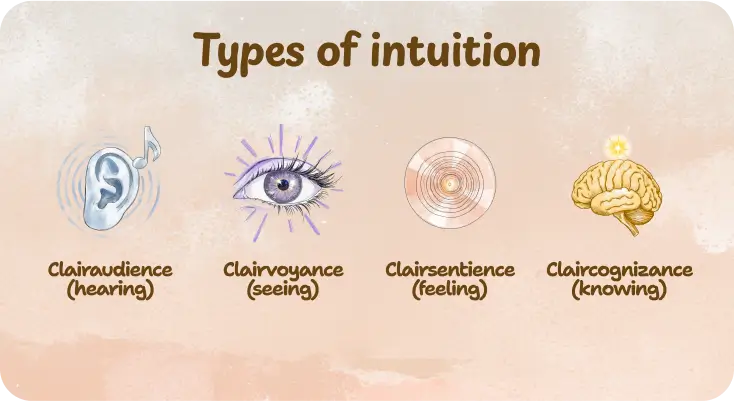Trusting your gut feeling may help you make faster and more confident choices, especially when there isn’t enough time for detailed analysis. Studies prove that intuitive strategic decision-making can be rather effective. [1]
In this article, we’ll explain more about what the sixth sense is, why we experience it, and how to use intuition in real life and improve it gradually.
Do you want to read people better and find a common language with anyone? This quick & free test will give you personalized tips on how to improve emotional intelligence.
Defining intuition
Intuition is the ability to understand something immediately without the need for conscious reasoning. It combines past experiences, analytical thinking, subconscious pattern recognition, and sensory information to process what’s happening around.
In psychology, intuition is a non-sequential information processing mode, which comprises both cognitive and affective elements. [2] Intuition isn’t the opposite of logic. People can sometimes make logically valid conclusions automatically, which is called logical intuition. [3]
While the gut feeling is another way we process information, intuition can lead to mistakes. Emotions or habitual patterns might influence our inner signals. So, it’s important to approach it with critical thinking and clearly understand how our intuition works.
How does intuition work? The cognitive process behind intuitive responses
Our brains constantly collect, process, and store data about everything happening around us. When it comes to intuition, they analyze this information in the background without our need to focus on it and quickly compare it to what we’ve already experienced. This way, brains spot patterns and predict what might happen next.
Simon Maurice McCrea from the Departments of Neurology and Neuroophthalmology, Canada, studied intuition and has found out that there are several parts of the brain responsible for the gut feeling.
- The right side of the brain (right hemisphere) helps you spot patterns and “see” answers before you can explain them.
- Emotional centers (limbic system) give gut feelings their strength, which is why hunches often feel so real.
- Decision areas (orbitofrontal cortex & caudate nucleus) quickly weigh past experiences and let you make fast choices without overthinking.
- Memory and practice zones (basal ganglia & temporal lobes) store skills, making your intuitive predictions sharper the more you use them.
- Senses and visuals (occipitotemporal regions) point out tiny details in faces, places, or situations that your brain processes instantly. [4]
For many people, intuition can be a difficult concept that can sound like an inner voice. However, it has a strong scientific background behind it.

Types of intuition
The way gut feelings manifest can vary from person to person and even for one human being depending on the situation. There are various unofficial classifications of intuitions, so we’ll highlight a few for you to gain a better understanding.
Types of intuition based on business and social psychology studies
The research published in Business Horizons focused on the forms of intuition that managers develop during the work process. Nevertheless, these findings can also be applied to real life, as this is how intuition may work.
1. Expert intuition
This is intuition that comes from experience. For instance, you believe that you shouldn’t invest in a deal because similar situations in the past led to problems, even if you can’t immediately explain why.
2. Creative intuition
Intuition that allows you to generate new solutions and come up with creative ideas. It stems from your ability to combine knowledge, experiences, and patterns in novel ways.
3. Social intuition
This concept relies on your previous interactions with other people, the way you approach others, and how you read social cues. It helps you spot unspoken signals in others’ behavior to predict their reactions and intentions.
4. Temporal intuition
It allows people to create or capture opportunities that arise at the right moment. This type of intuition helps you sense when the timing is ideal for making decisions or launching new ideas and increases the chances of success. [5]
Find out how well you recognize your needs, feelings, and desires to live a fulfilling life.
The “Clairs” (sensory types of intuition)
In spiritual practices, the “Clairs” may be perceived as something that comes from the astral plane and lets you receive guidance from supernatural powers. Yet, in scientific terms, these are just ways to define how our brains provide intuition in different forms.
1. Clairaudience (hearing)
It feels like an inner voice coming out of nowhere that tells you what to do or not to do. Clairaudience may come as a clear phrase, word, or directive guiding your decision.
2. Clairvoyance (seeing)
This type of intuition appears as mental pictures, almost like short flashes in your mind. They can be symbols, scenes, or quick images that provide you with a sense of what’s happening.
If you’ve seen the animated film Ratatouille, you might remember the scene when Remy the rat “sees” flavors in his mind as colors and shapes before even tasting them. This is what clairvoyance means — it’s an inner vision that helps him understand what combinations work best.
3. Clairsentience (feeling)
Some people feel what they need to do next and have a clear awareness of whether something is wrong or right. This kind of intuition may show up as a sudden sense of comfort or discomfort, even when there’s no logical explanation. It’s like the body signaling the best direction to take.
4. Claircognizance (knowing)
It seems like you know what to do next. You may feel like it comes to your consciousness from nowhere, and you just know the answer or the truth instantly. In reality, it’s also a result of a thorough prior analysis that the brain has processed in the background.

Is intuition reliable?
Intuition isn’t 100% reliable and can’t provide a definite final answer. Still, it might point in the right direction and help your consciousness focus on things you haven’t thought about before.
For example, if you want to purchase an apartment and meet a real estate agent for the first time, your inner voice might tell you that something is wrong. When you notice small hesitations, conflicting information, or subtle body language, you should double-check the property and the papers. Even if the agent seems professional, trust your gut in decision-making.
Your self-awareness and ability to recognize subtle signals of your psyche define how effectively you can use intuition. Try Breeze’s self-discovery tests and find out how hidden patterns shape your everyday choices.
How to pick reliable intuitive clues
Sometimes your intuition can also be confusing. It might blend real observations with personal biases, fears, or wishes. Here are some tips to find out whether intuition may be true:
- Compare feelings with evidence. Turn on logic and analyze how likely your intuition might be true. Think about whether your assumptions are relatable to facts or whether they’re based on assumptions or emotions.
- Analyze whether you’ve already faced similar situations. If something similar has already happened and you handled it successfully, your own intuition might work better, as it reflects patterns your brain has learned from experience.
- Take a moment to notice your reactions. Don’t hurry and forget about judgment. You can even write down or say out loud your suspicions when you’re alone. This way, you’ll help your mind sort out real signals from random feelings or worries.
Expert Insight
“When people ask me how to know whether or not their intuition is reliable, I usually recommend a few things. First, pay attention to how you are feeling. If you are feeling overwhelmed, angry, or anxious, what you think your intuition is may actually be related to these emotions. Genuine intuition signals tend to be calmer and steadier. Second, pay attention to whether or not the “gut sense” keeps showing up. If it does, then it could be intuition. If you make a decision based on intuition, later consider whether your intuition was correct. This will help you recognize intuitive signals.”
Emily Mendez
Mental health professional
Intuition vs. instinct vs. insight
There might arise confusion between the terms, as all three describe ways we respond to information or situations. The study published in Psychological Inquiry differentiated intuition, instinct, and insight. [6]
| Aspect | Intuition | Instinct | Insight |
| Nature | Learned, often unconscious response | Automatic reaction | Understanding the essence of a problem |
| Origin | Acquired through experience and practice | Inborn or biological | Can be intuitive or deliberate |
| Key notes | Sometimes described metaphorically as “instinctive,” but it is actually learned. | Not learned, purely an automatic response | Can arise intuitively or through conscious reasoning. Not the same as intuition. |
Can insight sometimes feel like intuition, even if it comes from step-by-step reasoning? Emily Mendez, M.S., Ed.S, answers, “Insight and intuition can feel similar. But these are two distinct things. The difference is how you arrive at the conclusion. Insight usually emerges from sustained effort, such as testing new ideas or analyzing a problem. It often comes as the result of problem-solving. Intuition, on the other hand, often comes quickly and unconsciously, without you realizing it. It’s often from pattern recognition.”
Intuition vs. rational thinking
Relying on intuition can be a quick way to make a decision, while rational thinking might seem more reliable. Yet, these two work best together when you know how to use each one.
| Aspect | Intuition | Rational thinking |
| Basis | Gut feelings, subconscious patterns, and experience | Facts, step-by-step analysis |
| Speed | Immediate | Slower |
| Conscious effort | Low. Thoughts arise automatically. | High. Decisions require focus and reasoning. |
| Accuracy | Can be accurate but sometimes biased | Generally consistent if the data is correct |
| Use | Quick decisions, uncertain or complex situations | Detailed planning, structured problem-solving |
| Emotional involvement | Often linked to emotions | Less influenced by emotions, more objective |
| Strengths | Integrates experience and works with incomplete information | Is reliable and gives a clear understanding of reasoning |
| Weaknesses | Can be influenced by unrelated emotions | Can be slow, may miss subtle signs |
How to use intuition and rational thinking together
The most effective approach is to use your intuitive feelings to identify the direction that feels right; for instance, if you’re thinking about changing jobs, list variants that feel right for you without judging them. Once you’re ready, turn to consciousness and access each variant. If we talk about jobs, think about how each choice aligns with your skills, values, long-term goals, salary expectations, and lifestyle.
This way, intuition generates possibilities, and rational thinking helps you make a well-informed decision.
How often do you rely on intuition?
What triggers intuition?
While intuition plays a vital role in how we process data, it is automatic and can’t be summoned on demand like rational thinking. Intuitive answers can come up to your mind when you are relaxed, have some time to focus on yourself, and get mindful. New situations, emotions, or stress can make intuition stronger, while intense unrelated emotions (like anger or anxiety) may distract you.
How to strengthen your intuition
You can always improve your gut instincts and train them like muscles in the gym. Try these exercises and repeat them regularly to make decisions and plan the future with greater confidence.
1. Practice the “first answer rule”
When you need to choose something simple, like a meal at a restaurant, go with the first pick without overthinking it. Do it by deciding what to wear, how to spend your weekend, and which task to do first. This technique trains you to notice and trust your initial gut response.
2. Notice repeated clues
Sometimes your sixth sense can provide repeated answers to the same question. For example, if you feel lost in life and confused about your future, and at the same time keep thinking about visiting another country, maybe it’s worth trying.
3. Use the “yes/no check”
When you face another decision, imagine that your answer is “yes.” Think about how you feel about it; notice the emotional response. In the same way, imagine that you answer “no.” Then pick the variant that feels calmer.
4. Take 10 minutes of silence daily
When feeling overwhelmed with daily tasks, humans can simply miss emotional responses. Thus, it’s better to spend at least some time a day limiting informational overload and focusing on what you really feel. Intuitive signals can become clearer.
5. Note quick thoughts
As you can understand from the definition, intuition is fast and automatic. Thus, if you journal immediate thoughts and mood shifts (for example, using the Breeze app), after some time, you’ll be able to notice intuitive signals that are most reliable for your decisions.
6. Review past decisions
Similarly, you can think about the decisions you’ve already made and how you approached them. Maybe there were some that you made with the help of intuition. Remember this feeling and think about what you relied on: your gut, a sudden thought, or a subtle emotion.
7. Stay present, whatever you do
Being mindful is another powerful way to notice new concepts arising in your head. When you do something, try to focus on the here and now without judgment. Don’t try to analyze your whole life; just pay attention to what you feel at the moment.
If you want to improve your social intuition, pay full attention in conversations. Listen and notice small cues like tone, pauses, body language, and emotions, as they can reveal what people really feel or think.
8. Test your intuition with small decisions
To evaluate how strongly you can rely on your intuition, gain some evidence that it works. Try to use it in small decisions: when choosing a meal for dinner, picking a route to walk, or deciding which book to read. Notice your first instinct, act on it, and then observe what happens. Over time, this practice helps you see which intuitive signals are trustworthy.

Final thoughts: Is intuition a superpower or a bias?
Intuition can be a superpower that allows you to plan your actions, make quick decisions, and guide behavior. At the same time, it’s important to be attentive and avoid confusing gut feelings with your fear or emotional responses. Use the tips from this article to develop our ability to recognize reliable intuitive signals and use them for the future.
Frequently asked questions
What is intuition according to psychology?
Intuition is the ability to know something directly without relying on analytic reasoning, bridging the conscious and non-conscious parts of the mind.
How accurate is your intuition for decision-making?
The accuracy of intuition is different across people, situations, and contexts. Some of us can perfectly feel when it’s time to start something new, while others see only part of the picture or may misread signals. Factors such as experience, attention, self-awareness, and emotional state all influence how reliable your intuitive judgments are.
What is an example of an intuition?
An example of intuition is a gut feeling you have without thinking it through. For instance, imagine going to a job interview and suddenly feeling uneasy about one of the interviewers. You may not know exactly why, but your instinct tells you to be careful. This is your intuition giving you a signal to pay attention.
Sources
- Neil Gareth Shepherd, Bowen Lou, John Maynard Rudd. “Going with the gut: Exploring top management team intuition in strategic decision-making.” Journal of Business Research. 2024
- Adinolfi P, Loia F. “Intuition as Emergence: Bridging Psychology, Philosophy and Organizational Science.” Front Psychol. 2022
- Ghasemi O, Handley S, Howarth S, Newman IR, Thompson VA. “Logical intuition is not really about logic.” J Exp Psychol Gen. 2022
- McCrea SM. “Intuition, insight, and the right hemisphere: Emergence of higher sociocognitive functions.” Psychol Res Behav Manag. 2010
- Walsh, Christian & Collins, Jamie & Knott, Paul. (2021). “The four types of intuition managers need to know. Business Horizons.” 65. 10.1016/j.bushor.2021.12.003.
- Hogarth, Robin. (2010). “Intuition: A Challenge for Psychological Research on Decision Making.” Psychological Inquiry.
Disclaimer
This article is for general informative and self-discovery purposes only. It should not replace expert guidance from professionals.
Any action you take in response to the information in this article, whether directly or indirectly, is solely your responsibility and is done at your own risk. Breeze content team and its mental health experts disclaim any liability, loss, or risk, personal, professional, or otherwise, which may result from the use and/or application of any content.
Always consult your doctor or other certified health practitioner with any medical questions or concerns
Breeze articles exclusively cite trusted sources, such as academic research institutions and medical associations, including research and studies from PubMed, ResearchGate, or similar databases. Examine our subject-matter editors and editorial process to see how we verify facts and maintain the accuracy, reliability, and trustworthiness of our material.
Was this article helpful?






